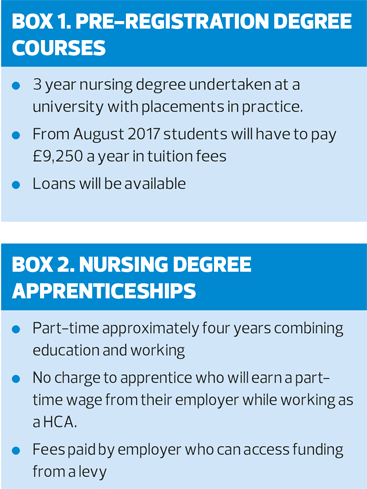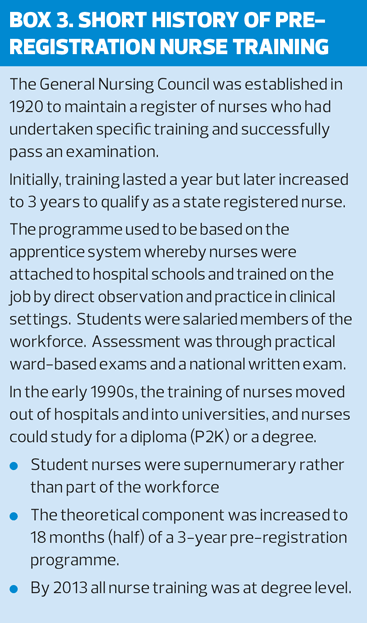Creating a modern nursing workforce or taking a gamble?
Tina Bishop
Tina Bishop
RGN, BSc (Hons), MA, Dip N (Lond)
Freelance primary care advisor,
Editor-in-Chief, Practice Nurse
This month sees the official end of bursaries for student nurses together with a host of other changes affecting nursing roles. Tina Bishop sums them up
There is a raft of changes taking place in nursing in terms of funding, roles and policy.
The current system whereby the Government finances universities to cover the cost of providing degree level education for students undertaking nurse training has been abolished, as of 1 August 2017, and with it the student nurse bursary in England. In Scotland, Wales and Northern Ireland, students can still apply for a bursary.
Students now undertaking degree level training will be required to pay their own university fees – of more than £9,000 a year – and student nurse bursaries have been scrapped. (Box 1) The move will save the Government £800 million a year, which could be used to fund additional nursing roles, but we already have 40,000 unfilled nursing posts.
The Government believes that the previous funding cap restricted the number of student nurse places, and by removing it, 10,000 additional training places can be made available.
The obvious question now though, is that although 10,000 more places may be created, will 10,000 more students decide to enter the profession? The current perception of low morale, poor pay, student debt and loan repayments does not paint a picture that students will find attractive, and UCAS has already reported a 23% drop in student nurse applications. This may just be a blip that will right itself over time, but at this point, we just don’t know.1
Later this year a new route to becoming a registered nurse will be available.
DEGREE APPRENTICESHIP
A new degree apprenticeship has been announced. It is being developed and designed to offer another route to nursing. Existing staff working in a health care setting who meet the criteria can – with the support of their employer – apply to undertake apprenticeship nurse training while maintaining their role in practice. In this way they can earn while they learn.
Nursing degree apprentices will not be required to fund the programme themselves. The cost of this will be paid by the employer who will be able to access funds via an apprenticeship levy.2
Most programmes will take approximately four years (part-time), and if the apprentice has prior learning and experience (APEL) which is acceptable to the educational institution then the length of the programme could be shortened.
Learning will take place at NMC-approved educational providers, and apprentices will be expected to achieve the same standards as other student nurses. Students will also be required to undertake placements outside their work setting.
THE NURSE ASSOCIATE
The Nurse Associate role is a new health care role created by the Department of Health in England to work in a variety of health care setting. Designed to bridge the gap between health care assistants and registered nurses, this new type of care worker will have a higher level of skills and knowledge to support and compliment the registered nurse who will still have overall responsibility for assessing, planning and evaluation of patient care.
Training to become a nurse associate will run over a two year period and will comprise work-based learning, through close collaboration between employers and education providers. The training is set at level 5 and successful candidates will leave with a foundation degree.
The training of nurse associates will provide a standalone qualification but may also provide the opportunity to progress to higher qualifications and becoming a registered nurse.
The Nursing and Midwifery Council has agreed to regulate nursing associates, and is in the process of developing standards program.
DOES CURRENT PRE-REG EDUCATION PREPARE NURSES FOR THE FUTURE?
The NMC has recently launched a consultation on the standards that the UK registered nurse will need to meet in the future. The current pre-registration standards, which date back to 2010, are not seen as fit for purpose for the future role of nursing.
The consultation also sets out proposals for a new educational framework for nursing and midwifery.
This consultation is driven by enormous population and demographic changes, and advances in technology, and recognises that health care is profoundly different today than it was even 10 years ago. The nurse of the future will be expected to undertake more complex roles in a variety of care settings including the community. There is a focus on public health and health promotion, increased mental health skills and extended clinical skills. It is worth finding the time to have a look and put your two pennyworth in – at nmc.org.uk/education/education-consultation – the consultation ends 12 September 2017.
Many of us who qualified before nursing was pitched at diploma or degree level, and who will have probably undertaken an apprentice-style training (Box 3), might think we have come full circle and that we might see benefits in returning to a learn-on-the-job approach. However many of us who then went on to complete degrees part time (while also working full- or part-time) will know what a hard slog this can be, so this is not a route that should be undertaken lightly. Nursing has traditionally attracted mature students who bring a wealth of life experiences with them. They may also have families.
Although the Nurse Associate role will be welcomed in many settings, particularly general practice where the numbers of HCAs are increasing, but who can vary enormously in their skills and education.
CONCLUSION
It is a great pity that the new roles and routes into nursing were not piloted and evaluated before the changes to student nurse funding were decided. This is why the RCN and 20 other healthcare organisations have described them as ‘an untested gamble that has not been properly risk assessed.’
REFERENCES
1. RCN News. Nursing shortage may worsen.
2. Department of Health. Policy paper: Nurse Apprenticeship fact sheet, December 2016.
Related articles
View all Articles

